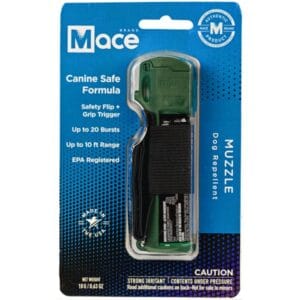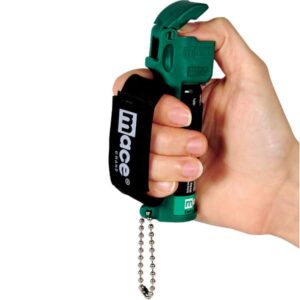
free shipping on orders over $49
We're having a 15% off sale on all our products. Enter your email below to be notified about future sales.




If you’re worried that pepper spray could kill a dog, rest assured it’s designed to temporarily incapacitate, not harm fatally. Formulated with capsaicinoids, dog pepper spray irritates the eyes, nose, and skin, leading to temporary discomfort and incapacitation. Typically, the effects last about 45 minutes with no long-term harm. It’s important to use it responsibly, only in self-defense situations, to protect both humans and animals. Misuse, such as for training, is considered animal cruelty. If a dog is exposed, immediate care like flushing with water helps. You’ll find that knowing the right approach can guarantee safety for everyone involved.
 Mace® Canine Repellent causes temporary discomfort and incapacitation in dogs, not death.
Mace® Canine Repellent causes temporary discomfort and incapacitation in dogs, not death.To effectively safeguard yourself from aggressive dogs, it’s vital to understand how dog pepper spray works and its legal implications.
Dog spray, specifically formulated for canines, contains a humane amount of capsaicinoids. This ingredient is key to the spray’s effectiveness, allowing it to temporarily incapacitate an aggressive dog without causing long-term harm.
It’s worth noting that this spray is legal in all 50 states for individuals 18 years or older to carry as a self-defense tool. However, it’s important to use dog spray responsibly. Misuse, such as employing it for training purposes or in situations not deemed as self-defense, is considered animal cruelty and is strictly prohibited.
When pepper spray hits a dog, it instantly causes severe irritation to their eyes, nose, and skin, leading to temporary incapacitation without long-lasting harm. This reaction is particularly important when dealing with aggressive dogs, as it allows for a non-lethal method to deter them, ensuring both your safety and the animal’s well-being. The active ingredient, capsaicinoids, is responsible for this immediate discomfort, but it’s formulated to be humane, minimizing harm while effectively neutralizing a threat.
The discomfort and pain your dog may experience typically last around 45 minutes. During this time, they might display signs of distress such as pawing at their face, excessive drooling, or struggling to breathe normally. It’s a tough sight, but remember, these effects are temporary.
If your dog ever gets sprayed, immediate care is important. Flushing their eyes, nose, and mouth with water can greatly alleviate their discomfort. However, if symptoms persist or your dog seems particularly affected, seeking veterinary care becomes necessary. This step isn’t just about relief; it’s about ensuring there’s no lasting damage from the encounter. Always prioritize your dog’s health and comfort, especially in such stressful situations.
Despite its design for humane use, pepper spray can still pose health risks to dogs if not used correctly. Formulated with a humane amount of capsaicinoids, it’s meant to be non-lethal, providing a temporary solution to incapacitate aggressive dogs without causing long-term harm. However, it’s important you grasp the potential health risks to make sure you’re using it responsibly, especially during dog attacks.
When you’re faced with an aggressive dog, your primary goal is to protect yourself without causing unnecessary harm to the animal. Pepper spray offers a safe alternative to physical force or lethal weapons, aiming to deter the dog temporarily. Yet, misuse or inappropriate application can lead to unintended consequences. It’s prohibited to abuse pepper spray, emphasizing the importance of using it only in self-defense situations and according to guidelines. This ensures the safety and well-being of both humans and dogs, preventing potential health risks associated with its misuse.
Now, let’s explore the long-term consequences of pepper spray on dogs, focusing on the health impact assessment and a review of behavioral changes.
You’ll learn how the chemical exposure might influence your dog’s well-being and behavior over time.
Understanding these effects is essential for responsible pet owners and those considering pepper spray for defense.
Evaluating the long-term health impacts of pepper spray on dogs reveals that its effects are typically temporary, with minimal lasting consequences. You’ll find that the use of pepper spray, while distressing in the moment, doesn’t lead to permanent harm when used correctly. Its formulation contains a humane level of Major Capsaicinoids, ensuring it incapacitates dogs temporarily without causing lasting damage.
| Aspect | Short-term Effects | Long-term Consequences |
|---|---|---|
| Physical Well-being | Temporary discomfort | No permanent damage |
| Need for Medical Care | Possible if symptoms persist | Rarely needed |
| Nature of Effects | Non-lethal, temporary | Minimal to none |
This table underscores that the effects on dogs are designed to be a safer alternative to more harmful measures, highlighting its role as a non-lethal deterrent.
Long-term behavioral changes in dogs, resulting from pepper spray exposure, can manifest as increased fear or aggression towards familiar or unfamiliar stimuli. These effects aren’t uniform and largely depend on your dog’s individual temperament and past experiences.
If your dog becomes more aggressive following an encounter with pepper spray, it’s important to understand that this behavior stems from fear and confusion rather than inherent hostility. Addressing these behavioral shifts requires patience, consistent training, and possibly the intervention of a professional dog trainer or behaviorist.
They’ll offer tailored strategies to help your dog overcome its newfound apprehensions or aggressive tendencies. Remember, the key to mitigating long-term consequences lies in understanding, patience, and appropriate behavioral modification techniques.
 As you contemplate carrying pepper spray for dogs, it’s vital to comprehend the right application techniques, safety precautions, and legal considerations.
As you contemplate carrying pepper spray for dogs, it’s vital to comprehend the right application techniques, safety precautions, and legal considerations.
You’ll want to make sure you’re using it effectively and lawfully to protect yourself without causing unnecessary harm.
Let’s explore how to achieve this balance, keeping both your safety and the well-being of dogs in mind.
To safely deter an aggressive dog without causing it long-term harm, it’s crucial to follow proper application techniques when using dog spray. Dog repellent, formulated with a humane amount of capsaicinoids, is designed to temporarily incapacitate an aggressive dog, not to cause lasting injury or pain.
Remember, it’s legal for individuals 18 years or older to carry dog spray in all 50 states, but it should only be used in self-defense situations, not as a means for training. Misusing dog spray, whether on pets or as a disciplinary tool, violates animal cruelty laws.
Always make sure you’re using dog repellent strictly as a last resort to protect yourself, maintaining both your safety and the wellbeing of the dog.
Understanding the appropriate application techniques, let’s now focus on the safety precautions you should follow when carrying and using pepper spray on dogs.
Pepper spray, formulated specifically for dogs, contains a humane level of capsaicinoids, ensuring it’s non-lethal. However, it’s important to use it responsibly. Only employ pepper spray as a last resort in self-defense against aggressive dogs to prevent harm without causing lasting damage.
Misusing pepper spray, such as for training or cruel purposes, isn’t only unethical but also illegal under animal cruelty laws. Make sure you’re storing pepper spray properly, away from family and pets, regularly check its expiration date, and practice safe usage. These steps are essential for the safety of both you and the dogs you might encounter.
Before delving into the legalities of pepper spray usage on dogs, it’s important you’re aware that while it’s a permitted self-defense tool across all states for those 18 and up, its application must strictly adhere to guidelines ensuring humane treatment of animals.
Carrying pepper spray designed for dogs, like SABRE Protector Dog Spray, aligns with legal standards, provided it’s used solely as a last resort in self-defense against aggressive animals. Misusing pepper spray, such as employing it for training, breaches animal cruelty laws.
Hence, it’s vital to understand that responsible use of pepper spray not only offers a humane way to protect yourself but also aligns with legal expectations to prevent misuse and ensure the well-being of animals.
When considering the use of pepper spray on dogs, it’s important to familiarize yourself with the legal implications to avoid potential legal troubles. It’s vital to understand that while pepper spray formulated for dogs, like SABRE Protector Dog Spray, is legal to carry in all 50 states for individuals 18 years or older, its use is strictly regulated. This type of spray contains a humane amount of Major Capsaicinoids, specifically designed not to kill dogs but to serve as a non-lethal deterrent against aggressive dogs.
You should never use dog spray as a training method for any animal, including dogs. Misusing pepper spray, even with the intent to protect yourself from an aggressive dog, can lead to legal consequences under animal cruelty laws if deemed excessive or unnecessary. Responsible use involves understanding and adhering to local laws, which may have specific regulations regarding the use of such deterrents.
Keeping pepper spray accessible for self-defense and ensuring its humane effects when used against an aggressive dog, aligns with a responsible and legal approach. Always prioritize de-escalation and understand the potential legal ramifications to steer clear of unnecessary legal issues.
Exploring alternative defense options provides you with safe ways to deter aggressive dogs without resorting to physical harm. One highly effective method is using pepper spray specifically designed for dogs, like SABRE Protector Dog Spray. This type of spray contains a vital amount of Major Capsaicinoids, ensuring it’s not lethal but still serves as a powerful deterrent. It’s essential to understand that these sprays are developed to be a non-lethal means of protection, offering you peace of mind without causing long-term harm to the canine.
Carrying dog pepper spray is legal across all 50 states for individuals who are 18 years or older. This legality underscores the spray’s recognition as a safe and effective defense option. However, it’s important to remember that misuse of this spray, such as employing it for animal training, is strictly prohibited under animal cruelty laws. This emphasizes the importance of responsible use, strictly for self-defense purposes.
Pepper spray stands out as a humane and reliable tool for deterring dog attacks. It provides a temporary incapacitating effect, allowing you to protect yourself and others without causing lasting harm to the animal.
If your dog doesn’t show improvement after flushing their eyes, nose, and mouth with water following pepper spray exposure, it’s important to seek veterinary help. Remember, the effects of pepper spray typically last around 45 minutes for dogs. However, if your furry friend is still in discomfort after this period, scheduling a vet visit becomes necessary. It’s vital to monitor your pet closely during recovery; their speed of recovery and level of discomfort are key factors in deciding on a vet visit.
During your vet visit, the professional might provide ointment for your dog’s burned eyes. Unfortunately, there’s no specific medicine to reverse the effects of pepper spray quickly. The vet’s support can be invaluable in easing your dog’s discomfort and ensuring a smoother recovery process.
Although the effects of pepper spray are temporary and don’t cause permanent damage, seeking veterinary care can offer additional support for your dog’s recovery. Don’t hesitate to reach out to a vet if you’re concerned about your dog’s condition post-exposure. Their expertise can make a significant difference in your pet’s comfort and well-being.
After ensuring your dog’s recovery from pepper spray exposure, it’s also important to understand how carrying dog spray can help prevent aggressive dog attacks. Formulated specifically for canines, pepper spray is designed to temporarily incapacitate them without causing long-term harm or death. This makes it not only an essential choice but also an effective one for deterring potential attacks and protecting yourself.
Carrying dog spray as a proactive measure can greatly reduce the risk of aggressive encounters. It’s a legal and accessible tool that ensures your personal safety while respecting the well-being of the dog. When used correctly, pepper spray can prevent dangerous situations from escalating, offering you a quick means to diffuse an attack without resorting to more harmful methods.
However, it’s important to understand that misusing pepper spray on dogs can be harmful. Therefore, educating yourself on the proper use of pepper spray is key to ensuring it serves its purpose as a defensive tool. By doing so, you’re not only protecting yourself but also acting responsibly towards animals, demonstrating a balance between safety and compassion.
Pepper spray causes temporary discomfort to dogs due to its pepper toxicity, but it won’t kill them. It’s a last-resort defense tool, and you must use it responsibly to avoid long-term harm.
Yes, pepper spray can stop a pitbull by causing temporary pain and incapacitation. It’s a non-lethal way to halt their aggressive behavior without long-term harm, factoring in breed behavior for safe and humane defense.
If you’ve accidentally pepper-sprayed your dog, immediately flush their eyes, nose, and mouth with water. Use a hose if you can, and keep rinsing as long as they’ll tolerate. Seek emergency care if symptoms persist.
If a dog attacks you, you’re legally allowed to use pepper spray for self-defense in all 50 states, as long as you’re over 18. It’s a safe, effective measure to protect yourself.
As always, be safe and be prepared.
See Also:
Black Belt Defender
1867 Caravan Trail #105
Jacksonville, FL 32216-2006
Call us toll-free: (800) 859-5566
Mon-Fri: 9:00 am – 5:00 pm EST
NH based, FL Warehouse
Online Orders: 24/7/365

